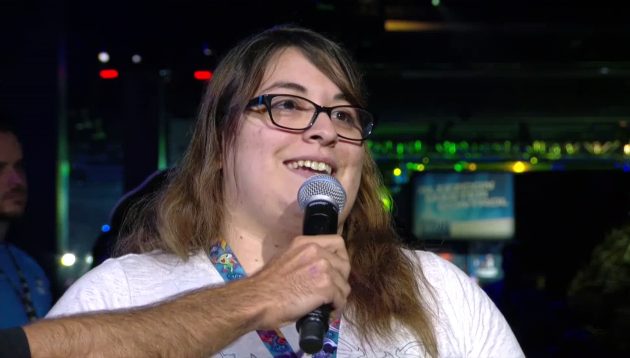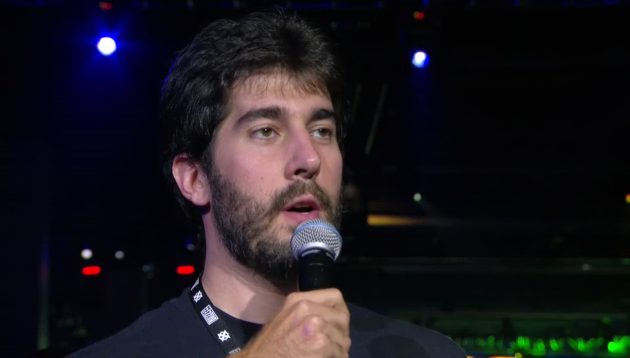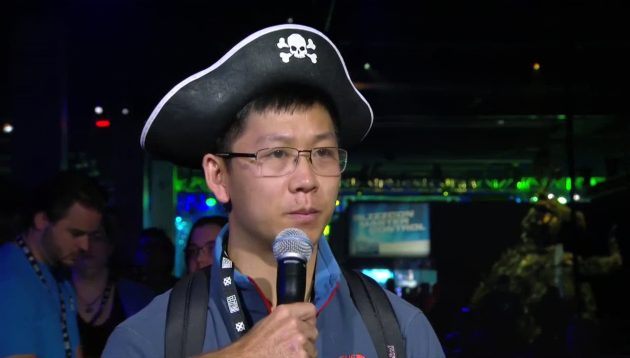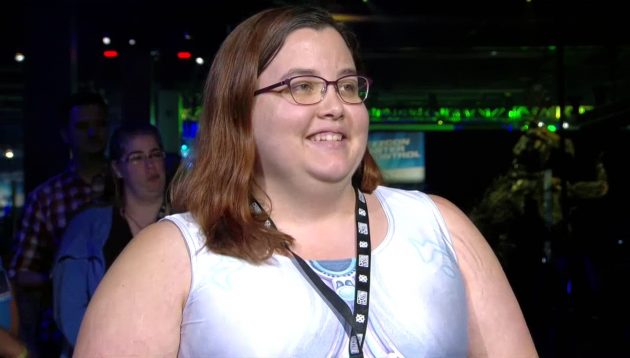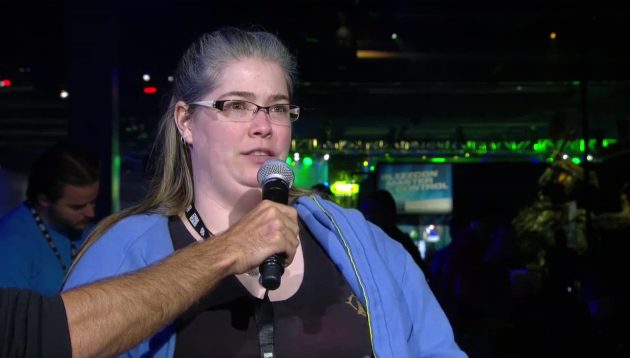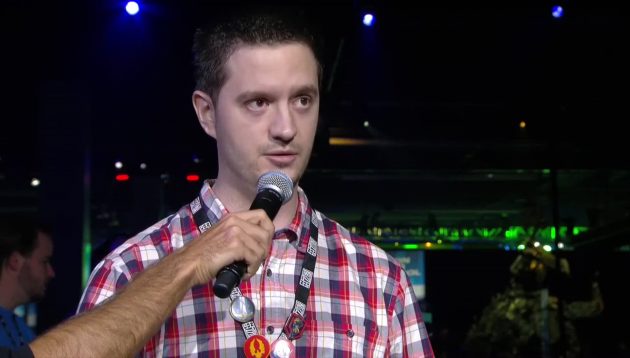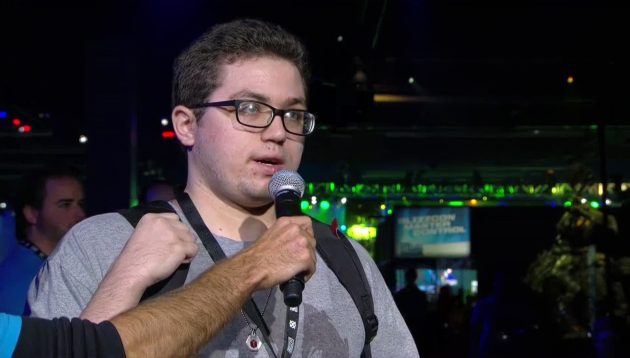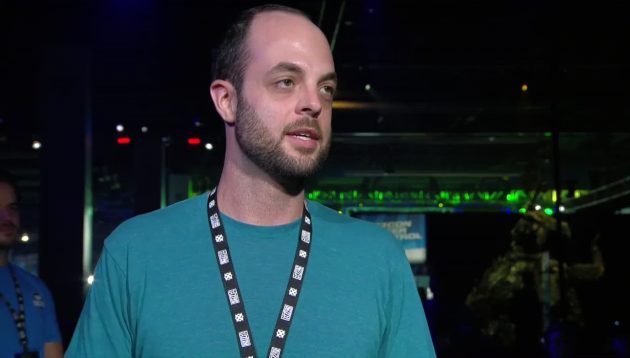Panel Q&A
Cate: Thank you very much, Tim. That concludes the individual questions I have for the panelists. Now I’m going to ask some general questions. Anyone can answer. Feel free to chime in. My first question, it’s kind of a personal one for me, because I know several of you have written for other universes: Star Trek and Star Wars among them. So I want to know how writing for those worlds compares with writing for Blizzard… and be gentle.
Christie: I’ll take that. I sat down and I figured out that I’ve written for 13 different franchises as of this year, and one of the remarkable things about Blizzard is there is always so much heart, and there is this great passion for what you do, and the desire to really connect with the writers.
I’m not saying the others don’t have that, but it’s just very much in the forefront here, and there is also a lot of times things go one-way from the franchise to the writer, and that’s fine, and that’s logical; but Blizzard seems a little more willing than most to receive as well as give ideas. So that is a great joy for me as a writer to almost co-write with an IP.
Cate: Thank you, Christie. Tim?
Timothy: You hear a lot of horror stories about authors working with different franchises. I’ve never had that problem. Every group I’ve worked with has been wonderful to work with. Blizzard was no exception. When I needed some help, they were there. When characters weren’t quite right, they would show me how to tweak them correct. So yeah, it’s been a wonderful experience, and Blizzard has just been marvelous.
Cate: Thank you very much. Anything to add Greg?
Greg: No, I mean, they have pretty much covered it. I’ve worked with Marvel and DC, and Lucasfilm and at minimum. Probably others too, but yeah there is a lot of back and forth with Blizzard, and that’s great. There’s a lot of ability to sort of go… I mean, you know I’m sending an email saying what do Yeti eat? and I get the answer within 24 hours.
Christie: What color is orc blood?
Greg: I mean, that’s great. You just have all these resources, and it’s really useful, and it’s terrific.
Cate: Shout out to our Lore Team. They work overtime on answering these questions. I’m gonna ask one more general question of the panel, and then I’m going to open the floor to audience questions. So start thinking about what you want to ask the members of our panel, and you could start lining up to the Blizzard crew by the microphones over there. And this question, I know it’s a favorite one for writers, because I think it’s safe to say that you have what many people in the audience would consider a dream job. So what advice do you have to people who want to break into the writing business? Don’t all answer at once.
Greg: My first advice is always to write, and it sounds so obvious, but I can’t tell you how many people come up to me who are really interested in being writers, and I’m like well how much have you written?
“Well I’ve got all these ideas, and I’m great!”
Have you written any of them down?
“I’ve got notes in a book.”
I’m like: Have you written any of it?
“Well, not yet!” and I’m like well then you’re not yet a writer. And so my advice to writers is to write. I have got a lot of other advice too: to read a lot, to proofread a lot, but first and foremost write; and don’t worry about whether it is good or not.
Seriously, just get in the habit of writing literally every single day. I don’t care how tired you are coming home from work, give yourself at least a half hour where you force yourself to write, because if you are a professional writer, you’ve got to work through all those things to make deadlines anyway.
I had a guy come up to me at a convention I was at recently, very passionate guy, and he had written something. He had written a comic book, which was great, and I said: “Well, how long is it?” He said: “Sixteen pages,” and they had self published it; and that was great, but I’m like: “Well, but these days a professional comic book is 20 pages. How long did it take you to write the script?”
He’s like: “Well, about six months,” and I’m like: “Well, I got to tell you, six months for sixteen pages is way too long.” So you need to be writing every day so that you can among other things just learn to get more quantity out, and I’m a quality guy, I appreciate that, but if you can’t get the quantity going then you’re not going to make it as a professional writer.
Micky: So kind of to piggyback on that, as writers we live in a great time right now where you have a lot of opportunities, especially online you can go to these websites like Wattpad, in different places, where you can put stories up there and if you’re updating your story every week, it really does force you to do exactly that to make sure that you are writing, because you know that you have to put that post up in one week, and you know that people are going to be reading that, and they’re going to give feedback to you. And that’s the other thing, psychologically as a writer, you want to get that feedback, and so these websites allow you to get that feedback immediately which is great. It’s great for you, to kind of boost your spirit and boost your confidence.
Christie: I would add that in addition to what Greg said, which is sit down and write, anything you can do to help make it a habit and get it fixed in your head. You said commit half an hour a day. I would say pick the same place and the same time every day, and a little trick that I learned a while ago (it’s kind of fun): The sense of smell is processed in the same part of the brain as long term memory. So if you have a scent that you like, like a candle, a sensual oil, or whatever it is, and you have that scent going when you write, all of these things that you start doing regularly are going to get your brain into gear faster. Your brain is going to be: “Oh, I’m sitting here at this time, I’m smelling this. It’s time to write,” and you are going to drop in a lot faster, and make the most of that half hour.
Cate: That’s great practical advice Christie. Any other tips from writers on the panel?
Robert: The only thing I would say was would definitely write every day, that’s perfect advice. You have to do that, but don’t put the pressure on yourself that what you are writing is going to be perfect, and it’s going to make your career like today. Like, that’s not really realistic. I would just put something down and work it out. Like, see how it goes, just try something. Maybe it works, maybe it doesn’t. If it doesn’t work, you leave it. No one else has to see it. If we keep doing that, you just get stronger as a writer. You learn what works, and what doesn’t. Just for you, even if no one else; and you will get better over time.
Greg: People talk to me a lot about writing for cartoons, or writing for television. I’m like write a script, then put it in a drawer. Don’t look at it for three months. Write a second script. Write a third script. After you’ve written the third script, go back and look at the first one. You’re going to look at it. You’re going to read it, and think it sucks! So rewrite it. Make it better. Then put it in a drawer again. Then take out the second script, and rewrite that. Start a fourth one. Start a fifth one.
The problem that I see: a lot of writers even artists also run into is they want that first thing to be perfect, and until that first thing is perfect, they can’t move on; and it just doesn’t work that way. I mean, I suppose it’s like theoretically possible that it might; but for most of us who do this professionally, we have to do a lot of rewriting and it means (particularly when you’re starting out) put things aside.
Don’t immerse yourself in it for three or four months. Let time pass. Look at it again with fresh eyes and you may be able to fix things that you couldn’t solve before, or notice things that are broken that you didn’t realize were broken before, and still it’s about writing and proofread. Please, God, proofread.
Cate: Alright, we are ready for some audience questions. We have the lights, camera, action! First question.
Hello, my name is Timonthy, and I’ve been a Blizzard fan since about six years old. My dad over there got me playing from a very early age, and I see that Blizzard as a company is moving towards that direction to get people to incorporate their children in this multi-generational experience. As writers, you really define what worlds these children and families are walking through together, and I wonder what content you produce that creates that same experience as a game for the children that they can not only be read to with their parents, but also be played with, as I did with my father; and if you see any new platforms, content, different types of games that we don’t even see Blizzard have today.
[bluepost]Cate: Is that a specific question for someone on the panel or–[/bluepost]
I came in late, so I don’t know very many of your names, but if anybody has it open, I’d be glad to hear what you have.
[bluepost]Cate: Multi-generational storytelling. I think we see that with Traveler for sure.
Timothy: Yeah, I think what Greg said about layering things so that the children, teens, and adults can all enjoy it; though, as you’re a trial to read twenty years later we’ll get something different out of it. They’ll see all the other stuff that they missed the first time. So for me, it’s a matter of you write a story (if you’re writing a battle), the reader can visualize what’s happening, and later perhaps go back to the game, and “oh, I see how this all works so;” but mostly it’s the layering thing I think.
Micky: And I’d say using universal themes as well. Themes that are going to resonate with all the different demographics.
Cate: That was a lot of the impetus behind doing Traveler in the first place. That so many of our players grew up playing Blizzard games, and now they have families of their own. So that was a very good question, thank you. And we’re ready for the next one.[/bluepost]
So this is for the guys on Chronicle. I’ve been playing Warcraft for over 10 years now, and seeing all of the lore that’s been kind of linked together in Chronicle is huge for me; but there’s one race that’s really lacking, and I don’t know if guys have plans to explore, but Tauren. I love Tauren so much, and there’s just not enough lore written about them, and there’s so much that’s still kind of unknown. Are there any plans to kind of explore that more?
[bluepost]Matt: Well, I can say specifically for Chronicle. I can say that in one of the next books, you know we’re going to talk about the Tauren a lot, and how they related to the Thrall and the Orcs in Warcraft III. So we’ll be talking about their culture a little bit and what they were like before you see them in World of Warcraft. Some of the struggles that they went through before they met Thrall in the new Horde.
Robert: Especially their war with the Centaur. We delved into that a little bit more because you know there was a good raid and dungeon, and stuff like that; but we dig into it more in a future volume.
Cate: Alright, thank you very much. Ready for our next question.[/bluepost]
Hi, there. So actually a little bit in the domain of the previous question. Firstly, I adore all the lore that’s being put into the Chronicle Books, so thank you so much. But there is something a little bit with what Christie Golden actually went into, just a little bit, with one of her books. We haven’t necessarily seen the world of Argus, and the ancient Draenei culture before they were the Draenei. Is there any plans to look into that into the future, or some in some written, or some other form?
[bluepost]Robert: I would be surprised if we didn’t. We don’t have a specific plan right now, but that’s only because our plans for the volumes of Chronicle that we have planned out right now don’t yet jump into a Legion content, which is where you would really start to see us delving into that stuff. Yeah like Chronicle Volume 2 starts at ancient Draenor, and it basically ends with the destruction of Draenor, when it becomes Outland.
So the end of Warcraft II, the expansion to be on the Dark Portal. So that’s sort of the scope of Volume 2, and Volume 3 doesn’t quite catch up to Legion, but if we go further than that, and we don’t know if we will; but if we do, that would certainly be something we would address.[/bluepost]
Hi, My name is Brian, you guys talk a lot about the back and forth between authors and Blizzard the company in the creative process, and I was wondering for the individual novels you guys have written or the work that you guys have done, how much comes in terms of initiative from the company and how much comes from the author pitching the plot?
[bluepost]Greg: Well in my case, Blizzard had the idea for Traveler in the first place, and the idea for the character of Aram, but they sought out pitches on it. So I was one, or more than one. I don’t know how many other people pitched. I wasn’t the only one, but I submitted an outline based on the materials that Blizzard gave me, and they liked what I wrote, and we went from there.
Micky: Usually by necessity, because it’s based on the game, Blizzard knows where the games are going, and so they’ll be a few steps ahead; and so they all have a pretty good idea of what the story content is that they are going to be looking for within the next year, year-and-a-half, and so Blizzard will typically put together the outlines and ideas, and then seek out authors and get their feedback.
Christie: And it depends on the stage of development too. I’ve worked with books that I had a thirty page outline that was very detailed, and then other books where they had an idea like we want to put Garrosh Hellscream on trial, and then we all just kind of got together and hammered it out together. So I think it depends on the needs of the project.[/bluepost]
Hello, my name’s Paige. I am actually a creative writing student at ASU, and I’m graduating in May, and you guys really do have like the ideal dream job that all of us always dream of, and more than just write everyday, what is your advice for someone like me who’s just about to go into the field? Like, where do I start? Like, what is the advice that you guys wish you had when you went into this field?
[bluepost]Christie: I was a cautionary tale, and the number one thing I would tell people in “don’t be like Christie with this.” I had a full length novel that I shopped around for 7 years, and I got the good rejection letters. The ones that were dear Christie, not dear author. You know, like that, and they all said the same thing: This isn’t right for us, but send us your next — and I look at you, Greg. (laughs)
And I thought, this was the bizniz. So I didn’t write a next, and fortunately I got in through a side door which is another story; but I really wish I had heeded that advice, and kept writing, and kept doing other things; because there is a term for it in this called a trunk novel, and it’s called the trunk novel because that’s where you cut your teeth on your work, and it really just needs to stay in the trunk, it shouldn’t be published; and I have one, and I think a lot of authors do.
So my suggestion to you first thing, first go to writerbeware.org which is sponsored by Science Fiction Writers of America, tons of helpful information there, very practical information; and secondly, just keep going and keep going and keep going, and realize that your first baby may not be the one that gets to see the world.[/bluepost]
This is mostly for Mr. Weisman and Mr. Zahn. As you’ve written books, The Star Wars and the World of Warcraft universe, Blizzard universe, do you feel constrained by the universe, and what’s expected of the novels by the companies?
[bluepost]Timothy: We’re constrained in the same way as Basketball players are constrained by the size of the court, the number of people, the periods, etc. Leaves a lot of room for maneuvering. So there is always– I mean, for me it might have been a little constraining if I had to deal with characters that are already well established, but I got to do both, I got to do the established characters: Emperor Valerian, and such; but also create my own characters that I could meld-weave into the StarCraft universe. So I don’t feel any particular constraint except this is the universe, this is the tech, these are the aliens, find a good story to tell about them.
Greg: I mean writing Star Wars: Rebels, we just really wanted to try and capture the feel that it attracted us to Star Wars when we were kids, when I was 12 years old, and the first Star Wars movie came out, and I stood in line to see it. I wanted to get that feeling into the cartoon show, and the difference for Blizzard for me personally is that I wasn’t immersed in Blizzard ahead of time.
I immersed myself when I got the job, not before the fact. Whereas on Star Wars, I was already a huge fan; but the thing is everything is relative. So like I come in to Star Wars: Rebels feeling like: “Well, I’m a huge Star Wars fan, and then I meet some of the people at Lucasfilm that I’m working with, and I know nothing. Nothing.”
But fortunately, they knew everything. So it’s like you were saying… I mean, yeah there are always going to be borderlines and rules, and things like that; but you’re just trying to make the best version of whatever franchise you’re working in that you possibly can. And since in general, that’s what the franchise holders want too, it tends to work out pretty well.
Timothy: The goal is to write a good story and you can do that in any universe.
Cate: We have time for just a couple more questions.[/bluepost]
My name is Nick, and I’m from the Moonguard server. My question is for Christie, Matt, and Robert. First of all, just want to say I’m a big fan of the lore. The Warcraft story. Sometimes, gaps in the lore lead to speculation from fans, and often-times these gaps are filled in for conjecture from quests, NPC dialogue, comics, getting manuals, etc. Sometimes these secondary sources are retconned, and contradict each other, or change for gameplay reasons. Outside of literature such as the Chronicle, what would you say to fans trying to fill in the gaps to these lore, and answer some of these questions?
[bluepost]Robert: That’s a good question, I really like that question.
Matt: I was just going to say outside of Chronicle, something that we have worked on in the past, and we’ll continue working on the future is just things on the website. A lot of times there is a bio for a character on the website, or there is a write up about a zone, some stuff like that can also fill in some of those gaps sometimes.
Greg: I recommend index cards.
Cate: I think we have time for one more question.[/bluepost]
So this is to all the writers on the board. You’ve been working with Blizzard creating all these different stories, putting more characters in that never existed in the first place. You’ve created your own original characters that might have their own minor roles, might have really major roles, like Christie: you actually get one of your characters into the movie, so that’s pretty cool. How does it feel knowing you have created all these characters that people might love, might hate, might hate to love, might love to hate, how does it feel?
[bluepost]Christie: It’s a real honor. One of the great things about Blizzard when you play in their sandbox is they are very generous, and they often take something that you’ve done and put it in the game, or reference it, or something like that. Like I said, it does work both ways in Blizzard very often. So I think it’s really flattering, and it’s a real honor. Especially, when I get e-mails from people telling me how they like that specific character so much, and I feel very lucky to be in a position where I can do that.[/bluepost]
Thank you, keep up the good work guys.
Cate: Thank you. We do have time to see again one more question if it’s a quick one.
Hi, I’m Matthew Clements. I’m a novelist, screenwriter, game designer, I’ve work in the traditional pen and paper RPG industry, and I’ve worked with franchises that have been around for a long time, and I’ve started from scratch, and I’m wondering how important do you think it is to build your own worlds before you can play with someone else’s toys in their sandbox.
[bluepost]Micky: Yeah, I would definitely recommend that. I remember a young guy who came into Blizzard, and he had his sketches of his D&D characters. His name was Chris Metzen, and he brought in all these sketches and laid them out, and started talking about the D&D worlds that he had been building, and everything else; and there are plenty of people on the WoW team who got on to that team because of RPG worlds that they had built, and the world building that they had done for that was so impressive that it really helped them to get the job on the team. So, absolutely.
Timothy: As far as writing novels for something like Star Wars, they don’t accept just general submissions. It is an invitation only, and to be invited you need to prove you can come up with good ideas, you can write coherent stories, and you can deliver them on time — which is very important. So the more you can create of your own, the more track record you can build up of your own material, the easier it’s going to be to come to Blizzard, or whoever, and say: “I’d like to do this for you.“[/bluepost]
Cate: Alright, thank you very much. That’s all we have time for. So let’s give it up for our panelists one more time: Christie Golden, Micky Neilson, Matt Burns, Robert Brooks, Greg Weisman, and Timothy Zahn.
I invite you all to come up and meet the authors, you can buy a copies of their books, The Lord of the Clans, Rise of the Horde, StarCraft: Evolution, and World of Warcraft: Traveler, on the third floor meet the authors, ask them some more questions, get their signature starting at 2:15pm. That’s the third floor: author signing area, 2:15pm to 3:30pm. Thank you very much, and have a great BlizzCon.
Narrator: Thank you for attending the Building Worlds: Inside Blizzard Publishing panel. Up next, the In-Game Cinematics: The Cutscenes of Legion.
Transcriber: Iluv2proofread
Editor: Medievaldragon
| BLIZZCON 2016 BLIZZARD PUBLISHING PANEL TRANSCRIPT | ||
| Warcraft: Lord of the Clans | StarCraft II: The Keep | World of Warcraft: Chronicle |
| World of Warcraft: Traveler | StarCraft II: Evolution | Panel Q&A |
Hope you enjoyed this article. Please, support Blizzplanet via PayPal or Patreon, and follow us on Twitter, Facebook, YouTube, and Twitch for daily Blizzard games news updates. |
 |
 |
|
| Heroes of the Storm Cosplayers | |
| Heroes of the Storm: Deep Dive Panel Transcript | |
| Heroes of the Storm: State of the Game Panel Transcript | |
| Heroes of the Storm Interview |
 |
|
| Hearthstone Cosplayers | |
| Hearthstone: Mean Streets of Gadgetzan Panel Transcript | |
| Hearthstone Q&A Panel Transcript |
 |
|
| StarCraft II: Foundation of the Future Panel Transcript | |
| DeepMind and StarCraft II Deep Learning Panel Transcript | |
| StarCraft II Multiplayer Panel Transcript |
 |
|
| Diablo 20th Anniversary Panel Transcript (Necromancer) | |
| Diablo III Dev Talk Q&A Panel Transcript | |


